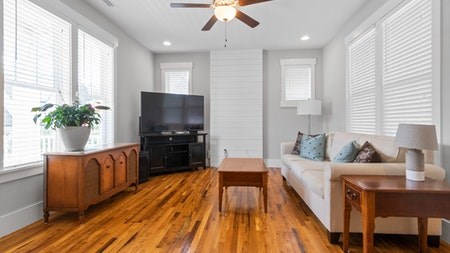A share block scheme is a different way to own property. These schemes allow for a single company to own a particular development while allowing individuals to buy the right to use a specific space within the development. In this article, we explain the in's and out's of Share Blocks, and what the shareholders are responsible for.
The Share Blocks Control Act
The Share Blocks Control Act of 1980 provides that a company shall be presumed to operate a share block scheme if any share of the company confers a right to or an interest in the use of immovable property or any part of immovable property. In such a case, the advertising and the sale agreements of these schemes must also comply with the provisions of the Act stating that the expression 'share block' or 'aandeleblok' (Afrikaans) should be included in or form part of the name of the company owning the underlying immovable property.
How the property is registered
As a buyer of a share in a share block scheme you do not own the apartment or section you intend to occupy. The property is registered in the name of the Share Block Company. You merely buy shares in the Share Block Company, and by obtaining these shares you acquire the right to occupy the apartment in question. Your rights and duties are regulated by the share block company's Memorandum and Articles of Association, and by a Use Agreement between you and the company. In addition to shares, purchasers also buy an 'allocated loan' which means they actually take over a portion of the liability of the company, which is paid through their monthly instalments. The deposit that a shareholder pays on a share block is paid into a trust account and the shareholder is entitled to the interest on the sum from the date of payment to the date of occupation. Purchasers have the right to pay the balance in full at any time. One of the downfalls is if the Share Block Company is declared insolvent, you may lose the rights to your portion of the property.
Trust Funds
The law requires that the trust fund be kept separately from all other money and that frequent audited statements be submitted to the Registrar of Companies. The registrar may also, at any time, order that an audited statement is submitted within a stated time (usually a period of not less than 30 days). Trust fund money may be used only for reducing the company's loan obligation (usually a loan acquired to fund the development of the share block scheme) and the legal requirement for frequent audited statements is a safeguard for the shareholders.
Shareholder responsibilities
Unless it was stated as an intention at the time the shares were offered, a share-block company may not increase its loan obligation without the approval of at least 75% of the shareholders holding at least 75% of the number of votes. In terms of the share block legislation, the developer may not vote. This is to protect shareholders from the developer being able to vote to increase the company’s loan obligations.
Shares in a share block company can be bought either directly from the company or from an existing shareholder, in which case all shares, rights and obligations are transferred to the new owner. A share in a share block company is not immovable property, so you cannot finance the purchase by means of a mortgage loan.
Every shareholder makes a monthly levy contribution for the general expenses of the scheme. The amount payable by each shareholder is usually fixed in relation to the number of shares held, and is used for the control, management, administration, upkeep and repair of the scheme.
Selling a Share Block property
A Share Block Building may not be sold without the approval, by special resolution of a general meeting, of the shareholders. Generally, a special resolution is one that is passed by at least 75% of the shareholders present at a general meeting. (At least 21 days' notice must have been given of the meeting and shareholders holding at least 25% of the total votes must have been present). Each share block is linked to the right to occupation and voting rights are allocated in proportion to the number of shares held.
Insurance and damage
Repairs or maintenance to installations falling inside of a section/unit/apartment, such as plumbing or electrical, are the financial responsibility of the shareholder.
The property must be insured by the company, although shareholders themselves must ensure that the contents of their units are insured. Generally, the company will not accept responsibility for damage arising from an accident or injury occurring inside a shareholder's unit. A public liability policy will most likely cover the company against mishaps that occur on common property, however, the directors may be held liable for any damages suffered in the event of their failure to insure the immovable property for the share block company.
The company cannot be sued for damage or inconvenience resulting from an accident if it is proven that due maintenance or caution was undertaken or exercised. If the premises are destroyed or rendered uninhabitable, the company is responsible for restoring the property and for ensuring that each shareholder receives substantially the same size, quality and location of premises that they had previously occupied. The company will not, however, pay the costs of a shareholder's alternative accommodation while the restoration is taking place.
Agreement breaches
The Share Block agreement remains in force for as long as a member holds shares or until the shareholder is entitled to transfer the shares. If a shareholder is in breach of the agreement in terms of payments (or other conditions in the agreement) provision is usually made for the company to ultimately take action to repossess the premises. In such a case, the shares may be resold and expenses and arrears may be recovered before the company pays the balance to the former shareholder.
Conversion of rights
Shareholders in a share block company can acquire title to the units they occupy only if the scheme is converted to sectional title. Under the Share Blocks Control Act, provision is made for the conversion of rights in an apartment under the share block system to sectional title, provided this is approved by the relevant local authority and complies with all the other requirements of the Sectional Titles Act and the Share Blocks Control Act.
This article originally appeared in Property Power 11th Edition Magazine. To order your copy at the discounted price of R120 click here.



